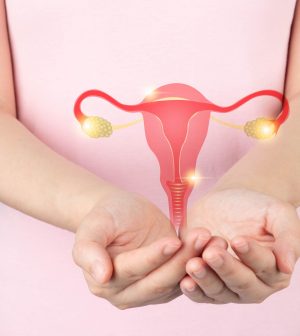- Could Your Grocery Store Meat Be Causing Recurring UTIs?
- Are You Making This Expensive Thermostat Error This Winter?
- Recognizing the Signs of Hypothyroidism
- 10 Strategies to Overcome Insomnia
- Could Artificial Sweeteners Be Aging the Brain Faster?
- Techniques for Soothing Your Nervous System
- Does the Water in Your House Smell Funny? Here’s Why
- Can a Daily Dose of Apple Cider Vinegar Actually Aid Weight Loss?
- 6 Health Beverages That Can Actually Spike Your Blood Sugar
- Treatment Options for Social Anxiety Disorder
Ovary Removal When Young Could Raise Parkinson’s Risk

Women who have both of their ovaries removed before age 43 have an increased risk of developing Parkinson’s disease or parkinsonism, according to a recent study.
This may owe to the sudden loss of estrogen and other hormones, which causes an abrupt endocrine dysfunction in premenopausal women, researchers said.
Study results were similar to 2008 research that also linked Parkinson’s with removal of both ovaries in younger women, a procedure called bilateral oophorectomy.
Parkinson’s is a progressive disorder that affects the nervous system and parts of the body controlled by nerves. Symptoms include tremors, stiffness and slowing of movement. It is often accompanied by dementia, sleep disorders and bowel and bladder problems. Parkinsonism is a general term for slowness of movement along with stiffness, tremor or loss of balance.
Researchers said the findings support current guidelines that women with average risk for ovarian cancer should not have both ovaries removed to prevent it.
For those who have a high-risk gene variant for ovarian cancer, removal of ovaries may be recommended along with post-surgery estrogen therapy until age 50 or 51.
“As of today, it is not recommended to use estrogen therapy for the prevention of dementia or parkinsonism after spontaneous menopause in women who are age 46 to 55,” said first author Dr. Walter Rocca, a neurologist and epidemiologist at the Mayo Clinic in Rochester, Minn.
“But this study and previous studies suggest that estrogen therapy is important in women whose ovaries were surgically removed younger than age 46,” he said in a clinic news release. “Particularly vulnerable are women who underwent this surgically induced menopause before age 40.”
The study included data on 2,750 women who had surgery to remove both ovaries, for either a benign condition such as endometriosis or a cyst or to prevent cancer. They were compared with 2,749 women who had not undergone surgery.
For every 48 women younger than age 43 at the time of surgery, one additional woman developed Parkinson’s compared to women of the same age who did not have their ovaries removed.
However, the risk of Parkinson’s was lower in women who received estrogen after the procedure and through age 50 years compared with women who did not.
Parkinson’s disease is twice as common in men as in women, suggesting that gender-related factors play a role, the study noted.
The findings were recently published in JAMA Network Open.
More information
The U.S. National Institute on Aging has more on Parkinson’s disease.
SOURCE: Mayo Clinic, news release, March 23, 2023
Source: HealthDay
Copyright © 2026 HealthDay. All rights reserved.










